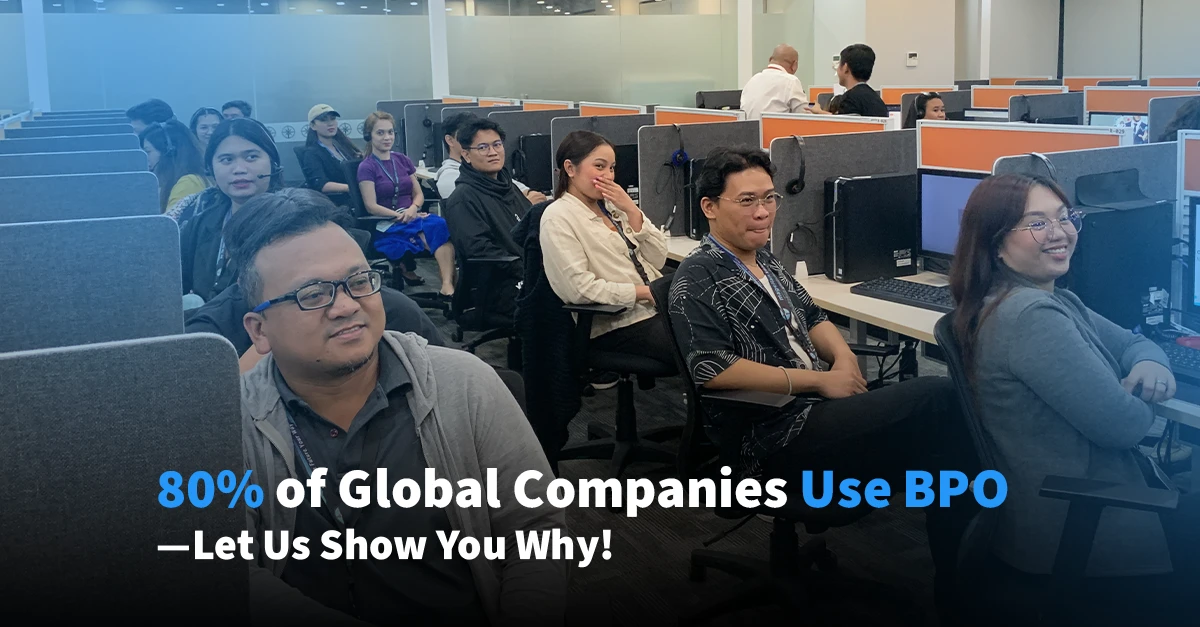Schedule a FREE call with our outsourcing expert now and get a precise quotation that meets your requirements. Don't wait - get started today!
BPO (Business Process Outsourcing) has evolved from a simple cost-cutting tool to a strategic asset for businesses globally. With the growing demand for streamlined operations, the advantages of BPO—like enhanced efficiency and cost savings—have businesses across all industries talking. In this article, we’ll explore why BPO is becoming a game-changer for growth, examining key advantages of BPO that make it a competitive choice for companies worldwide.
What is BPO? An Overview of Types of BPO Services
BPO involves contracting specific business functions to external service providers. With different types of BPO services available—from customer service to IT support and HR—companies can select which areas to outsource based on their needs. This flexibility allows businesses to focus on core business activities, enhancing overall productivity.
Typically, BPO services are categorized into back-office and front-office functions. Back-office BPO includes tasks like data management, payroll, and compliance, while front-office BPO encompasses customer-facing roles, such as customer service and tech support. Both offer specialized services that help businesses save time, resources, and costs, giving them a competitive edge.
Cost Savings: Why BPO Reduces Operational Expenses
One of the most significant benefits of BPO is cost savings. By leveraging BPO, companies eliminate the need for substantial infrastructure investments, such as employee benefits, office space, and tech equipment. Instead, they only pay for the services they need, often at a fraction of the cost of in-house teams. This arrangement can be particularly beneficial for small and medium-sized businesses, allowing them to scale efficiently without overwhelming costs.
Research suggests that businesses can save up to 70% on labor costs through offshore outsourcing, making it an attractive option for companies in competitive markets. The ability to reduce costs significantly without sacrificing quality is why so many businesses are exploring the advantages of BPO.
How Cost Savings Support Business Growth
Cost savings are not just about slashing budgets. For many companies, the funds saved through BPO are redirected to other growth areas, such as marketing, research and development, or talent acquisition. This reinvestment is often vital for smaller businesses aiming to scale without incurring significant upfront expenses.
Boosting Efficiency and Focus on Core Competencies
Outsourcing allows companies to focus on their core competencies, leading to greater operational efficiency. By outsourcing specific functions—like customer support or data management—companies can allocate more resources to areas that drive growth, such as product innovation or strategic planning. With specialized BPO providers handling support functions, companies can achieve faster results without sacrificing quality.
This focus on core business activities not only improves productivity but also strengthens the company’s position in its market. When internal teams can concentrate on strategic initiatives rather than routine tasks, they are better positioned to innovate and respond to changing market demands.
Increased Speed to Market
Another often-overlooked benefit of BPO is its impact on speed to market. With support functions being managed by external experts, businesses can streamline their internal processes, allowing for quicker project completion and product launches. This agility is especially valuable in fast-paced industries like technology and retail, where delays can lead to missed opportunities.
Flexibility with Time Zones: A Strategic Advantage
For companies with a global customer base, time zone differences allow round-the-clock service without added in-house costs. By partnering with an outsourcing company in different regions, businesses ensure that support is available 24/7, enhancing customer satisfaction and retention. This advantage is crucial in customer service, where timely responses can make all the difference in retaining loyal customers.
For instance, companies in the U.S. can partner with BPO providers in countries like the Philippines or India to ensure their customers receive real-time support, regardless of location. This time zone advantage not only boosts customer satisfaction but also enhances brand reputation, as customers appreciate prompt and effective service.
Access to Skilled Talent Pool and Enhanced Customer Service Quality
BPO provides access to a skilled and specialized talent pool, particularly in areas like customer service and technical support. Countries popular for BPO services, such as the Philippines and India, have established themselves as top outsourcing destinations due to their highly trained workforce and cost-effectiveness. According to Deloitte’s 2022 Global Outsourcing Survey, 63% of businesses cited access to skilled talent as a key benefit of outsourcing. This improved access significantly boosts customer experience and overall satisfaction by ensuring companies can rely on professionals with specific expertise.
Outsourced customer service not only reduces operational burdens but also strengthens brand reputation by providing consistent, high-quality support that fosters customer loyalty. Additionally, many BPO providers stay on the cutting edge of technology, using the latest tools and best practices to enhance client and customer experiences.
Specialized Training and Tools
BPO providers invest in specialized training and tools to maintain high standards. Unlike in-house teams, where training and resources may be limited, BPO providers have extensive onboarding processes and ongoing training programs. This focus ensures that employees working on outsourced services are equipped with the latest knowledge and skills.
Offshore Outsourcing for Global Competitiveness
Offshore outsourcing offers companies access to cost-effective talent in various locations, allowing them to stay competitive on a global scale. Countries like the Philippines and India offer highly skilled professionals at lower rates than domestic markets, enabling companies to reduce costs without sacrificing quality.
Outsourcing to countries with established BPO industries also gives companies a reliable infrastructure and mature processes, making it easier to implement and maintain outsourcing partnerships. This arrangement benefits businesses seeking efficiency while navigating a competitive global economy.
Call Centers as a Backbone of BPO
Call centers are one of the most popular types of BPO services, critical for customer satisfaction and retention. By outsourcing call centers, companies can ensure customers receive prompt and knowledgeable service, even as demand grows. BPO providers also bring specialized training and quality control, enhancing the customer experience and adding value to the brand.
Data Security and Compliance: Why BPO is a Secure Choice
One of the lingering concerns for companies considering BPO is data security and compliance. Established BPO providers take this aspect seriously, often implementing stringent security protocols and investing in compliance certifications to meet global standards.
Leading BPO providers often hold certifications such as ISO/IEC 27001, which ensures data security management and complies with data protection laws like GDPR (General Data Protection Regulation) for European customers. With these measures, BPO companies offer clients peace of mind that sensitive data is handled with the utmost security.
Scaling Operations with Ease
BPO providers offer the scalability companies need to grow quickly. Whether a business is looking to expand its customer service team or add resources for an upcoming product launch, outsourcing enables quick adjustments in team size and resources without the long recruitment and training process required for in-house employees.
This flexibility is especially valuable for seasonal businesses, such as retail, where demand fluctuates throughout the year. Rather than hiring temporary in-house staff, businesses can work with BPO partners to meet peak demand and then scale back as needed.
Improving Customer Experience through Quality Assurance
BPO companies emphasize quality assurance to ensure high performance in all outsourced tasks. Most BPO providers have dedicated teams and tools for monitoring service quality, such as customer satisfaction metrics, response time tracking, and complaint management. By consistently tracking and improving these metrics, BPO providers help businesses deliver superior customer experiences, ultimately strengthening brand loyalty.
Conclusion
With all these advantages, it’s clear why BPO is more than just a cost-cutting tool; it’s a strategic move toward sustainable business growth. By partnering with a reliable outsourcing company like Magellan Solutions, businesses can harness these benefits while maintaining quality and efficiency. Magellan Solutions offers a wide range of BPO services designed to meet your unique business needs—whether it’s improving customer service, streamlining operations, or scaling your workforce.
Unlock your business potential with us! Book your FREE 60-minute business consultation today, and let’s strategize how to elevate your operations—NO COMMITMENTS, just results-driven insights!
Frequently Asked Questions (FAQs)
1. What is Business Process Outsourcing (BPO)?
Business Process Outsourcing (BPO) is the practice of contracting specific business tasks, such as customer service, IT support, or HR functions, to an external provider. Companies use BPO to reduce costs, increase efficiency, and access specialized expertise.
2. What are the primary advantages of BPO?
The main advantages of BPO include cost savings, improved efficiency, access to specialized skills, flexibility with time zones, and the ability to focus on core business functions. BPO enables companies to streamline operations and often achieve faster results at a lower cost than handling these functions in-house.
3. How does BPO help with cost savings?
BPO reduces operational costs by eliminating the need for investments in infrastructure, employee benefits, and other overheads. Companies pay only for the services they need, often at a significantly lower cost than maintaining in-house teams.
4. What types of services are typically outsourced through BPO?
Common BPO services include customer service, technical support, data entry, payroll management, IT support, and human resources. BPO providers often specialize in either back-office functions (like data processing) or front-office functions (like customer service).
5. How does outsourcing to different time zones benefit a business?
Partnering with BPO providers in various time zones allows companies to offer round-the-clock services to customers. This setup is particularly beneficial for customer service and tech support, where timely responses are crucial, providing 24/7 support without requiring a continuous in-house team.
6. What security measures do BPO providers use to protect data?
Reputable BPO providers follow stringent security protocols and compliance standards, often holding certifications like ISO/IEC 27001 for data security management. These providers also comply with data protection regulations, such as GDPR, to ensure the safe handling of sensitive information.
7. How does BPO improve customer service?
BPO providers typically have specialized training programs and quality assurance processes to ensure high customer service standards. They also use the latest tools and technology to manage customer interactions effectively, leading to quicker response times and higher customer satisfaction.
8. How do I choose the right BPO provider?
When selecting a BPO provider, consider factors such as industry experience, expertise in the services you need, data security measures, and client reviews. It’s also important to ensure the provider aligns with your company’s goals and values. A reliable partner, like Magellan Solutions, will work closely with you to understand your needs and deliver quality results.















